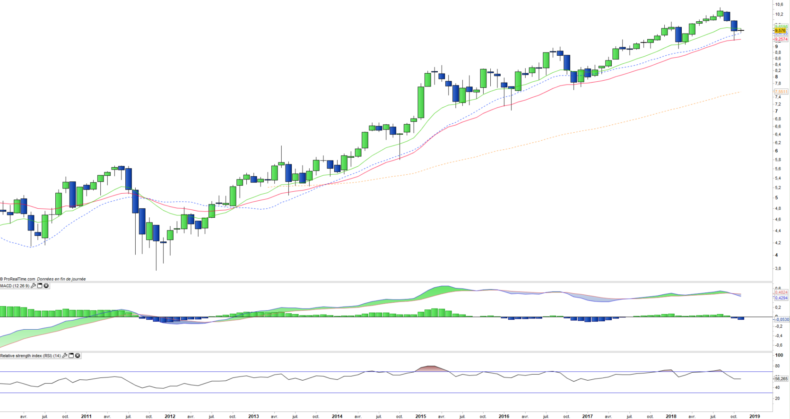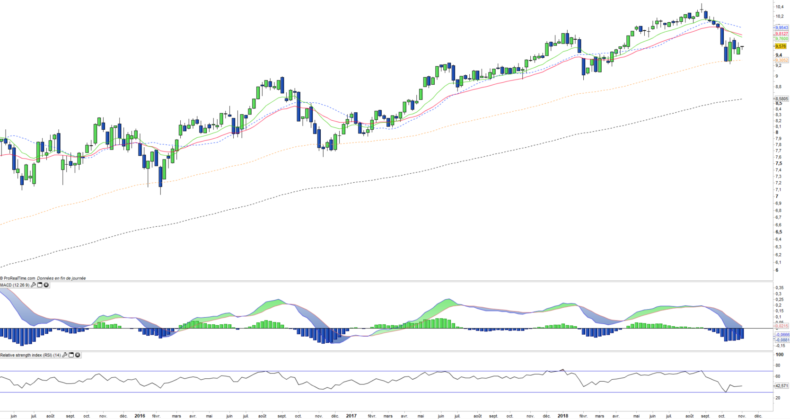BNPP Easy EPRA/NAREIT Eurozone Capped (EEE) - 07/11/2018
Short Term strategy: Negative (25%) / Trend -
Long Term strategy: Positive (65%) / Trend =
Characteristics of the ETF
The ETF BNP-Paribas EEE (Real Estate euro zone) created in 10/2015 in Euro and listed on Euronext seeks to replicate the index FTSE EPRA / NAREIT Eurozone Capped Net Total Return composed of 47 property values of the Euro zone, of which approximately 67 % of German and French holdings.
The fees of this ETF are 0.4% and the AUM of approximately € 661m. Replication is physical and there is a dividend policy.
Alternative ETFs: MEH (Lyxor in Euro), EPRE (Amundi in Euro), EXI5 (iShares in Euro)
Index & components
The objective of the ETF BNP Paribas EEE is to replicate the performance of the FTSE EPRA / NAREIT Eurozone Capped Net Total Return index, which is composed of the main property values representative of the listed real estate sector in the euro zone.
EEE is quite diversified, it is composed of 47 property stocks, of which 34,6% are German, 32,6% French and for the rest mainly Spanish (7,6%) and Belgians (9,5%).
The top 10 stocks account for around 58% of the index's capitalization, and the top 3 hold about 27%: (Unibail-Rodamco 10,1%), Vonovia (9%) and Deutsche Wohnen (7.8%), with market capitalizations between € 13 and € 20bn.
The real estate sector is influenced by many factors, the most important of which is certainly the inflation / interest rate pair. A low rate environment not associated with deflation is very favorable for real estate companies who generally use leverage to buy assets and which are also yield values.
Large listed property companies often seek quality assets, which allow them greater visibility on revenues and a better valuation. The two most represented countries are Germany and France, which offer different but also interesting features. In Germany, the price of assets has risen a lot recently but is cheaper than in France with a high appreciation potential while the dynamism of the German economy is a real asset. Moreover, there is a delay in the construction of housing, compared to the demand that comes in support for prices, as in France. The regulatory framework (eg rent ceilings), taxation and demography are also important factors.
We can distinguish two main businesses for listed property companies, which are residential (eg Vonovia and Deutsche Wohnen) and commercial real estate (eg Unibail-Rodamco), which have different business models with generally better resilience for commercial real estate apart from severe crises.
The scarcity of quality assets which restrains organic growth should lead to a consolidation of the sector, especially as the interest rate environment remains extremely favorable. There is also growing diversification in retirement home walls by some actors. The European property sector remains promising, given the better prospects in the euro zone, particularly in France.
However, it is important to pay attention to a possible change in monetary policy of the ECB which could lead to a new upward cycle on interest rates.
Latest developments
The EEA ETF posted a 6th consecutive annual increase in 2017 of 17.6% but is now in a slight decline of 1% since the beginning of 2018.
The index has held up well during the recent correction while the real estate sector is mainly sensitive to inflation rates and expectations, which are increasing slightly in Europe, which is mainly due to rising energy costs.
Long rates, however, remain at a modest level (10 years in France at 0.8% and 10 years in Germany at 0.43%). Fears over growth due to the US-China trade war are helping the sector by lowering long-term rates.
The sector is also driven by a logic of consolidation, due to the scarcity of assets which confers a speculative premium to certain players (as Hammerson approached by Klepierre). The sector also offers comfortable yields which provides a certain security for the investor as well as significant growth potential as long as the low interest rate environment persists.
Monthly data
The monthly chart shows a positive long-term trend that remains valid despite the current correction that is of comparable intensity to those of 2015 and 2016. Moving averages remain bullish and oscillators remain in the high zone which shows that the uptrend is intact. The current correction should therefore give way to a new bullish swing in the coming weeks.
Weekly data
ETF Objective
EEE is a UCITS ETF, listed in EUR, which replicates the FTSE EPRA/NAREIT Eurozone Capped (NTR) index.
Characteristics
| Inception date | 21/10/2015 |
| Expense ratio | 0,40% |
| Benchmark | FTSE EPRA/NAREIT Eurozone Capped Net Total Return |
| Code / Ticker | EEE |
| ISIN | LU0950381748 |
| Issuer | BNPP Easy |
| Currency | € |
| UCITS | Yes |
| Exchange | Euronext |
| Assets Under Management | 661 M€ |
| Replication Method | Physical |
| PEA (France) | No |
| SRD (France) | Yes |
| Dividend | Distribution (Capitalization for EEA) |
| Currency risk | No |
| Number of Holdings | 47 |
| Risk | 3/5 |
Country Breakdown
| Germany | 35% |
| France | 33% |
| Belgium | 9% |
| Spain | 8% |
| Netherlands | 4% |
| Ireland | 3% |
| Luxembourg | 3% |
| Others | 6% |
Sector Breakdown
| Résidentiel | 28% |
| Industriels | 23% |
| Diversifié | 21% |
| Distribution | 19% |
| Bureau | 6% |
| Commerce | 2% |
| Hébergement | 1% |
Top Ten Holdings
| Unibail Rodamco | 10% |
| Vonovia | 9% |
| Deutsche Wohnen | 8% |
| Gecina | 7% |
| Leg Immobilien | 6% |
| Klepierre | 4% |
| Merlin Properties Socimi | 4% |
| Foncière des Régions | 4% |
| Aroundtown | 4% |
| Immobiliaria Colonia | 3% |


